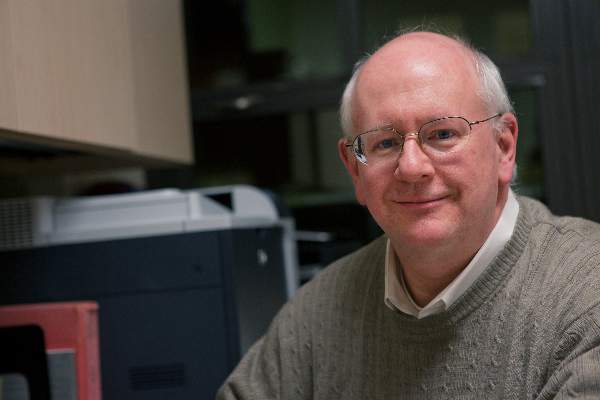User login
VIENNA – The investigational P13K-delta inhibitor TGR-1202 was clinically active in relapsed or refractory chronic lymphocytic leukemia and other hematologic malignancies in an ongoing phase I trial.
TGR-1202 is entering an increasingly crowded field of P13 kinase inhibitors including idelalisib (Zydelig) and duvelisib, but a more benign safety profile may separate it from the pack.
“It has a different AE [adverse event] profile, compared with some of the other agents, with a little less on the hepatotoxicity side and, at least to date, we actually haven’t seen any evidence of colitis,” Dr. Owen O’Connor said at the annual congress of the European Hematology Association.
Citing recently reported data, grade 3/4 diarrhea/colitis occurs in 10%-22% of patients treated with idelalisib, idelalisib plus ofatumumab, or duvelisib versus just 1% of all 137 patients treated in TGR-1202 studies to date, he noted.
TGR-1202 also has less grade 3/4 pneumonia (4%) and elevated liver enzymes (2%), compared with rates of 13%-16% and 13%-17%, respectively, for the other P13K therapies.
Further, just 4% of all patients have discontinued TGR-1202 because of adverse events vs. 12% on idelalisib, 31% on idelalisib plus ofatumumab, and 33% on duvelisib.
“I think this may bode well as we think about how to combine P13 kinase inhibitors into other regimens to try to look at various combination regimens,” said Dr. O’Connor, director of the Center for Lymphoid Malignancies at Columbia University in New York.
He presented data on 66 patients with relapsed or refractory B- or T-cell malignancies including non-Hodgkin lymphoma, chronic lymphocytic leukemia (CLL)/small lymphocytic leukemia and Hodgkin lymphoma. More than half (55%) had received at least three prior therapies (range 1-14) and 52% were refractory to the most recent regimen.
The dose-escalation study evaluated TGR-1202 once-daily at doses of 50 mg to 1,800 mg and a micronized formulation dosed at 200 mg to 1,800 mg.
The most common adverse event of any grade was nausea (41%), diarrhea and fatigue (32% each), headache and vomiting (23% each), and cough (21%), Dr. O’Connor said. Grade 3 or 4 adverse events were neutropenia (11%), anemia (8%), hypokalemia and dyspnea (5% each), and diarrhea and constipation (2% each).
A strong dose-response relationship was observed among 51 patients evaluable for efficacy, with higher doses of TGR-1202 (1,200-mg initial formulation or ≥ 600 mg micronized) demonstrating rapid and profound responses, he said.
In the CLL subgroup, 14 of 16 patients (88%) achieved a nodal partial response and 10 (63%) achieved a response per International Workshop on CLL (iwCLL) criteria.
Of the 12 evaluable patients with follicular lymphoma, 5 achieved a partial response (nodal reduction > 50%), with 3 of the 6 patients treated at higher doses reaching a partial response.
A heavily pretreated patient with Hodgkin lymphoma also achieved a near-complete response, Dr. O’Connor said.
At the time of the analysis, 37 of 66 patients had received micronized TGR-1202 at doses ≥ 800 mg. Of these, 25 remain on study and have reached a median progression-free survival of 9.5 months.
Expansion cohorts are enrolling at 800 mg and 1,200 mg of the micronized formulation, and are the targeted doses for phase II studies in development, he said.
Duvelisib
In a separate presentation during the same session, phase I results showed twice-daily duvelisib 25 mg resulted in an overall response rate of 88%, including 15 partial responses in 17 evaluable patients with treatment-naive CLL.
All but one of nine patients with a deleterious P53 mutation or 17p deletion achieved a partial response, Dr. Susan O’Brien of University of California, Irvine, reported.
“The advantage of duvelisib is that responses are more rapid than with other single agent B-cell receptors,” she said in an interview.
The median time to iwCLL response was 3.7 months, with 7 of the 15 responses occurring by the first assessment (cycle 3, day 1).
Pharmacodynamic and mechanism of action studies show duvelisib, an oral P13K-delta/gamma inhibitor, produces rapid inhibition of phosphorylation of AKT (pAKT) sustained through cycle 2, day 1 and near-complete inhibition of CLL proliferation (Ki67) following 1 cycle of duvelisib.
Key serum chemokines and cytokines known to contribute to CLL growth and survival also decreased following duvelisib, suggesting modulation of the tumor microenvironment, Dr. O’Brien said.
Of the 18 patients treated in the CLL expansion cohort, 10 remain on treatment and 8 discontinued treatment, including 6 patients who discontinued treatment because of adverse events. The median time on treatment was 14 months (range 1-20 months). Adverse events were mostly grade 1 or 2, reversible, and clinically manageable, she said.
The most common grade 3 adverse events were diarrhea (22%) and liver enzyme elevations (17%), with grade 4 neutropenia occurring in 28%.
In 16 patients with baseline computed tomography assessments, 88% achieved a nodal response (≥ 50% reduction in measurable area of disease) and all had a PR per iwCLL.
Median progression-free and overall survival had not been reached, with a 92% PFS rate and 94% survival rate at 18 months, Dr. O’Brien said. One patient died during follow-up, about 5 months after the last duvelisib dose.
Based on the pharmacodynamic/pharmacokinetic profile and clinical activity, the 25-mg twice-daily dose has been selected for phase III evaluation, she said.
On Twitter@pwendl
VIENNA – The investigational P13K-delta inhibitor TGR-1202 was clinically active in relapsed or refractory chronic lymphocytic leukemia and other hematologic malignancies in an ongoing phase I trial.
TGR-1202 is entering an increasingly crowded field of P13 kinase inhibitors including idelalisib (Zydelig) and duvelisib, but a more benign safety profile may separate it from the pack.
“It has a different AE [adverse event] profile, compared with some of the other agents, with a little less on the hepatotoxicity side and, at least to date, we actually haven’t seen any evidence of colitis,” Dr. Owen O’Connor said at the annual congress of the European Hematology Association.
Citing recently reported data, grade 3/4 diarrhea/colitis occurs in 10%-22% of patients treated with idelalisib, idelalisib plus ofatumumab, or duvelisib versus just 1% of all 137 patients treated in TGR-1202 studies to date, he noted.
TGR-1202 also has less grade 3/4 pneumonia (4%) and elevated liver enzymes (2%), compared with rates of 13%-16% and 13%-17%, respectively, for the other P13K therapies.
Further, just 4% of all patients have discontinued TGR-1202 because of adverse events vs. 12% on idelalisib, 31% on idelalisib plus ofatumumab, and 33% on duvelisib.
“I think this may bode well as we think about how to combine P13 kinase inhibitors into other regimens to try to look at various combination regimens,” said Dr. O’Connor, director of the Center for Lymphoid Malignancies at Columbia University in New York.
He presented data on 66 patients with relapsed or refractory B- or T-cell malignancies including non-Hodgkin lymphoma, chronic lymphocytic leukemia (CLL)/small lymphocytic leukemia and Hodgkin lymphoma. More than half (55%) had received at least three prior therapies (range 1-14) and 52% were refractory to the most recent regimen.
The dose-escalation study evaluated TGR-1202 once-daily at doses of 50 mg to 1,800 mg and a micronized formulation dosed at 200 mg to 1,800 mg.
The most common adverse event of any grade was nausea (41%), diarrhea and fatigue (32% each), headache and vomiting (23% each), and cough (21%), Dr. O’Connor said. Grade 3 or 4 adverse events were neutropenia (11%), anemia (8%), hypokalemia and dyspnea (5% each), and diarrhea and constipation (2% each).
A strong dose-response relationship was observed among 51 patients evaluable for efficacy, with higher doses of TGR-1202 (1,200-mg initial formulation or ≥ 600 mg micronized) demonstrating rapid and profound responses, he said.
In the CLL subgroup, 14 of 16 patients (88%) achieved a nodal partial response and 10 (63%) achieved a response per International Workshop on CLL (iwCLL) criteria.
Of the 12 evaluable patients with follicular lymphoma, 5 achieved a partial response (nodal reduction > 50%), with 3 of the 6 patients treated at higher doses reaching a partial response.
A heavily pretreated patient with Hodgkin lymphoma also achieved a near-complete response, Dr. O’Connor said.
At the time of the analysis, 37 of 66 patients had received micronized TGR-1202 at doses ≥ 800 mg. Of these, 25 remain on study and have reached a median progression-free survival of 9.5 months.
Expansion cohorts are enrolling at 800 mg and 1,200 mg of the micronized formulation, and are the targeted doses for phase II studies in development, he said.
Duvelisib
In a separate presentation during the same session, phase I results showed twice-daily duvelisib 25 mg resulted in an overall response rate of 88%, including 15 partial responses in 17 evaluable patients with treatment-naive CLL.
All but one of nine patients with a deleterious P53 mutation or 17p deletion achieved a partial response, Dr. Susan O’Brien of University of California, Irvine, reported.
“The advantage of duvelisib is that responses are more rapid than with other single agent B-cell receptors,” she said in an interview.
The median time to iwCLL response was 3.7 months, with 7 of the 15 responses occurring by the first assessment (cycle 3, day 1).
Pharmacodynamic and mechanism of action studies show duvelisib, an oral P13K-delta/gamma inhibitor, produces rapid inhibition of phosphorylation of AKT (pAKT) sustained through cycle 2, day 1 and near-complete inhibition of CLL proliferation (Ki67) following 1 cycle of duvelisib.
Key serum chemokines and cytokines known to contribute to CLL growth and survival also decreased following duvelisib, suggesting modulation of the tumor microenvironment, Dr. O’Brien said.
Of the 18 patients treated in the CLL expansion cohort, 10 remain on treatment and 8 discontinued treatment, including 6 patients who discontinued treatment because of adverse events. The median time on treatment was 14 months (range 1-20 months). Adverse events were mostly grade 1 or 2, reversible, and clinically manageable, she said.
The most common grade 3 adverse events were diarrhea (22%) and liver enzyme elevations (17%), with grade 4 neutropenia occurring in 28%.
In 16 patients with baseline computed tomography assessments, 88% achieved a nodal response (≥ 50% reduction in measurable area of disease) and all had a PR per iwCLL.
Median progression-free and overall survival had not been reached, with a 92% PFS rate and 94% survival rate at 18 months, Dr. O’Brien said. One patient died during follow-up, about 5 months after the last duvelisib dose.
Based on the pharmacodynamic/pharmacokinetic profile and clinical activity, the 25-mg twice-daily dose has been selected for phase III evaluation, she said.
On Twitter@pwendl
VIENNA – The investigational P13K-delta inhibitor TGR-1202 was clinically active in relapsed or refractory chronic lymphocytic leukemia and other hematologic malignancies in an ongoing phase I trial.
TGR-1202 is entering an increasingly crowded field of P13 kinase inhibitors including idelalisib (Zydelig) and duvelisib, but a more benign safety profile may separate it from the pack.
“It has a different AE [adverse event] profile, compared with some of the other agents, with a little less on the hepatotoxicity side and, at least to date, we actually haven’t seen any evidence of colitis,” Dr. Owen O’Connor said at the annual congress of the European Hematology Association.
Citing recently reported data, grade 3/4 diarrhea/colitis occurs in 10%-22% of patients treated with idelalisib, idelalisib plus ofatumumab, or duvelisib versus just 1% of all 137 patients treated in TGR-1202 studies to date, he noted.
TGR-1202 also has less grade 3/4 pneumonia (4%) and elevated liver enzymes (2%), compared with rates of 13%-16% and 13%-17%, respectively, for the other P13K therapies.
Further, just 4% of all patients have discontinued TGR-1202 because of adverse events vs. 12% on idelalisib, 31% on idelalisib plus ofatumumab, and 33% on duvelisib.
“I think this may bode well as we think about how to combine P13 kinase inhibitors into other regimens to try to look at various combination regimens,” said Dr. O’Connor, director of the Center for Lymphoid Malignancies at Columbia University in New York.
He presented data on 66 patients with relapsed or refractory B- or T-cell malignancies including non-Hodgkin lymphoma, chronic lymphocytic leukemia (CLL)/small lymphocytic leukemia and Hodgkin lymphoma. More than half (55%) had received at least three prior therapies (range 1-14) and 52% were refractory to the most recent regimen.
The dose-escalation study evaluated TGR-1202 once-daily at doses of 50 mg to 1,800 mg and a micronized formulation dosed at 200 mg to 1,800 mg.
The most common adverse event of any grade was nausea (41%), diarrhea and fatigue (32% each), headache and vomiting (23% each), and cough (21%), Dr. O’Connor said. Grade 3 or 4 adverse events were neutropenia (11%), anemia (8%), hypokalemia and dyspnea (5% each), and diarrhea and constipation (2% each).
A strong dose-response relationship was observed among 51 patients evaluable for efficacy, with higher doses of TGR-1202 (1,200-mg initial formulation or ≥ 600 mg micronized) demonstrating rapid and profound responses, he said.
In the CLL subgroup, 14 of 16 patients (88%) achieved a nodal partial response and 10 (63%) achieved a response per International Workshop on CLL (iwCLL) criteria.
Of the 12 evaluable patients with follicular lymphoma, 5 achieved a partial response (nodal reduction > 50%), with 3 of the 6 patients treated at higher doses reaching a partial response.
A heavily pretreated patient with Hodgkin lymphoma also achieved a near-complete response, Dr. O’Connor said.
At the time of the analysis, 37 of 66 patients had received micronized TGR-1202 at doses ≥ 800 mg. Of these, 25 remain on study and have reached a median progression-free survival of 9.5 months.
Expansion cohorts are enrolling at 800 mg and 1,200 mg of the micronized formulation, and are the targeted doses for phase II studies in development, he said.
Duvelisib
In a separate presentation during the same session, phase I results showed twice-daily duvelisib 25 mg resulted in an overall response rate of 88%, including 15 partial responses in 17 evaluable patients with treatment-naive CLL.
All but one of nine patients with a deleterious P53 mutation or 17p deletion achieved a partial response, Dr. Susan O’Brien of University of California, Irvine, reported.
“The advantage of duvelisib is that responses are more rapid than with other single agent B-cell receptors,” she said in an interview.
The median time to iwCLL response was 3.7 months, with 7 of the 15 responses occurring by the first assessment (cycle 3, day 1).
Pharmacodynamic and mechanism of action studies show duvelisib, an oral P13K-delta/gamma inhibitor, produces rapid inhibition of phosphorylation of AKT (pAKT) sustained through cycle 2, day 1 and near-complete inhibition of CLL proliferation (Ki67) following 1 cycle of duvelisib.
Key serum chemokines and cytokines known to contribute to CLL growth and survival also decreased following duvelisib, suggesting modulation of the tumor microenvironment, Dr. O’Brien said.
Of the 18 patients treated in the CLL expansion cohort, 10 remain on treatment and 8 discontinued treatment, including 6 patients who discontinued treatment because of adverse events. The median time on treatment was 14 months (range 1-20 months). Adverse events were mostly grade 1 or 2, reversible, and clinically manageable, she said.
The most common grade 3 adverse events were diarrhea (22%) and liver enzyme elevations (17%), with grade 4 neutropenia occurring in 28%.
In 16 patients with baseline computed tomography assessments, 88% achieved a nodal response (≥ 50% reduction in measurable area of disease) and all had a PR per iwCLL.
Median progression-free and overall survival had not been reached, with a 92% PFS rate and 94% survival rate at 18 months, Dr. O’Brien said. One patient died during follow-up, about 5 months after the last duvelisib dose.
Based on the pharmacodynamic/pharmacokinetic profile and clinical activity, the 25-mg twice-daily dose has been selected for phase III evaluation, she said.
On Twitter@pwendl
AT THE EHA CONGRESS
Key clinical point: The investigational P13K inhibitors TGR-1202 and duvelisib were clinically active in phase I trials.
Major finding: TGR-1202 prompted an iwCLL response in 63% of 16 patients with relapsed or refractory CLL, while duvelisib did so in 88% of 17 treatment-naive CLL patients.
Data source: Two phase I studies in CLL and other hematologic malignancies.
Disclosures: TG Therapeutics sponsored the TGR-1202 study. Dr. Owen and several co-authors reported financial ties with TG Therapeutics. Infinity Pharmaceuticals sponsored the duvelisib study. Dr. O’Brien disclosed that eight coinvestigators are employees of Infinity.


